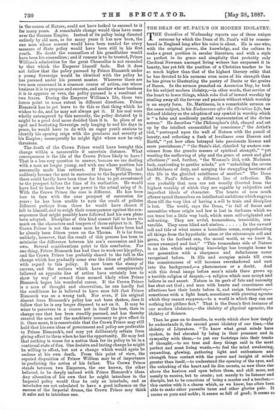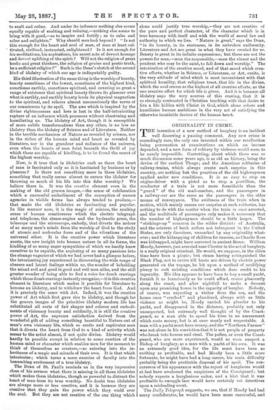THE DEAN OF ST. PAUL'S ON MODERN IDOLATRY.
THE Guardian of Wednesday reports one of those unique sermons by which the Dean of St. Paul's will be remem- bered in England long after his voice is silent. He is one who, with the original power, the knowledge, and the culture to make a great position in secular literature, and with a style so perfect in its grace and simplicity that probably only Cardinal Newman amongst living writers has surpassed it in beauty, has yet felt the position of a Christian teacher to be so much higher than that of the highest literary critic that he has devoted to his sermons even more of his strength than he has given to illustrating the poetry of Dante or the genius of Bacon. In the sermon preached on Ascension Day, he took for his subject modern idolatry,—in other words, that service of the heart to lower things, which robs God of inward worship by stealing away all the fervour and passion without which worship is an empty form. Dr. Martineau, in a remarkable sermon on the same subject, in his Endeavours after the Christian Life, has defined idolatry as the adoption of any symbol in worship which is " a false and needlessly partial representation of the divine nature." He describes "the Philosopher's idol, shaped and set up by the intellect unsanctified by conscience ;" the Artist's idol, "portrayed upon the wall of Nature with the pencil of beauty, and reflecting a flush of loveliness over Heaven and Earth," "yet how often betrayed into passionate license and mere peevishness ;" "the Stoic's idol, chiselled by austere con- science from the granite masses of spiritual strength," "yet wanting the mellowing of pity and the grace of sweet and glad affections ;" and, further, "the Woman's idol, with Madonna look, captivating to gentler minds," yet "enfeebling the severe healthfulness of duty, and merging the struggling heroisms of this life in the glorified saintliness of another." The Dean of St. Paul's follows a different line of reflection. He sees probably that men are not usually diverted from the highest worship of which they are capable by subjective and imperfect ideals of character. The hearts of men much oftener spend themselves on intellectual ambitions which engross them till the very idea of having a will to train and discipline is lost. The world, says the Dean, "is full of forces and necessities whose origin and law is lost in darkness which we can trace bat a little way back, which seem self-originated and self-acting. They are awful, tremendous, irresistible, irre-
versible. They seem blind and aimless In the onward roll and tide of what seems a boundless ocean, comprehending all things from the hypothetic atom or the microscopic cell and germ, to the farthest sun, the moral world, as we know it, seems swamped and lost." "This tremendous side of Nature is an idea which enlarging knowledge has brought home to our generation with a sharpness and definiteness never recognised before. It fills and occupies minds till even the consciousness of will becomes overshadowed and cast into the background,—a phenomenon or a doubt. And with this dread image before men's minds there grows up a terrible religion of despair,—a religion which men accept and believe in and assert. Nature in its garb of fate and necessity has shut out God ; and men with hearts and consciences and affections bow their heads before it, and resign themselves,— sometimes with a light heart, sometimes with piercing agonies which they cannot suppress,—to a world in which they can see nothing but pitiless fact." That is the Dean's first instance of our modern idolatries,—the idolatry of physical agencies, the idolatry of Science.
Then he goes on to describe, in words which show how deeply he understands it, the second great idolatry of our time,—the idolatry of Literature. " To know what great minds have spoken, to feel elevated by being in their presence and in sympathy with them,—to put our footsteps into their tracks of thought,—to see true and deep things said in the most perfect and most living words,—to feel the mind awakening, expanding, glowing, gathering light and enthusiasm and strength from contact with the power and insight of minds greater than itself,—to understand the opening of the eyes, and the unlocking of the heart and its dim secrete, as new ideas rise above the horizon and open before them, and still more, not merely to receive, but to create ; not merely to be listener and disciple, but to be conscious of being a master and a teacher,— this carries with it a charm which, as we know, has often been able to make other pursuits tame and other glories pale. It seems so pure and noble; it seems so full of good; it seems so
to exalt and refine. And under its influence nothing else seems equally capable of exalting and refining,—nothing else seems to bring with it good,—so to inspire and fortify ; so to calm and sober and enlighten." Why should men look beyond ? " Is not this enough for the heart and sonl of man, of man at least col- ' tivated, civilised, instructed, enlightened ? Is it not enough for his meditations, his aspirations, his secret acts of devout homage and devout uplifting of the spirit Will not the religion of great books and great thinkers, the religion of genius and poetic truth, be a sufficient religion?" Such is the Dean's sketch of the second kind of idolatry of which our age is indisputably guilty.
His third illustration of the same thing is the worship of beauty, beauty sometimes of the lowest, sometimes of the highest kind, sometimes earthly, sometimes spiritual, and covering so great a range of existence that spiritual beauty throws its glamour over what is earthly, and earthly beauty lends its physical magnetism to the spiritual, and relaxes almost unconsciously the nerve of our consciences by its spell. The awe which is inspired by the divine righteousness and love is lost in the half-intoxicating rapture of an influence which possesses without chastening and humiliating us. The idolatry of Art, though it is susceptible of more subtle transformations than any other, is no less an idolatry than the idolatry of Science and of Literature. Neither in the terrible mechanism of Nature as revealed by science, nor in the riches of the human mind and heart as revealed by literature, nor in the grandeur and radiance of the universe, even when the hearts of men faint beneath the thrill of joy which these are capable of kindling, is to be found the secret of the highest worship.
Now, is it true that in idolatries such as these the heart of man is fascinated only as it is fascinated by business or by pleasure ? Is there not something more in these idolatries, something that really seems almost to excuse the idolater for throwing so much of his life into this false worship P We believe there is. It was the creative element even in the making of the old graven images,—the sense of exhilaration which a successful embodiment of the conception of unseen agencies in visible forms has always tended to produce,— that made the old idolatries so fascinating and popular. In like manner now, it is the magic of science, the exalting sense of human creativeness which the electric telegraph and telephone, the steam-engine and the hydraulic press, the telescope and the microscope, embody, that diverts the ardour of so many men's minds from the worship of God to the study of atomic and molecular force and of the vibrations of the universal ether. It is the creative power which literature exerts, the new insight into human nature in all its forms, the kindling of so many eager sympathies of which we hardly knew ourselves to be capable, the exploring of so many passions into the strange vagaries of which we had never had a glimpse before, the intoxicating joy experienced in discovering the wide range of obscure and latent feelings within us, the wonder of beholding the mixed evil and good in good and evil men alike, and the still greater wonder of being able to find a voice for dumb cravings which those dumb cravings instantly recognise,—itis this creative element in literature which makes it possible for literature to become an idolatry, and to withdraw the heart from God. And it is precisely the same with Art. Indeed, it was the creative power of Art which first gave rise to idolatry, and though for the graven images of the primitive idolatry modern life has substituted all sorts of fair shapes and colours and embodi- ments of visionary beauty and sublimity, it is still the creative power of Art, the supreme satisfaction derived from the wonderful gift of adding something beautiful to Nature out of man's own visionary life, which so exalts and captivates men that it diverts the heart from God to a kind of activity which seems to the artist almost, if not quite divine. Idolatry would hardly be possible except in relation to some exertion of the human mind or character which enables men for the moment to think of themselves as creators,—as entering into the in- heritance of a magic and miracle of their own. It is that which intoxicates ; which turns a mere exercise of faculty into the benumbing excitement of a true idolatry.
The Dean of St. Paul's reminds ns in the very impressive close of his sermon what there is missing in all these idolatries which makes them idolatries, though so powerful to distract the heart of man from its true worship. No doubt true idolatries are always more or lees creative, and it is because they are creative that they gain the power which they wield over the soul. But they are not creative of the one thing which alone could justify true worship,—they are not creative of the pure and perfect character, of the character which is in true harmony with itself and with the world of moral law and authority in which we live. "Nature is great," says the Dean, "in its bounty, in its sternness, in its unbroken uniformity. Literature and Art are great in what they have created for us. Beauty is great in its infinite expressions; but these are not the powers for man,—man the responsible,—man the sinner and the penitent who may be the saint, to fall down and worship." The intoxication of the creative mood, and of that mood which crea- tive efforts, whether in Science, or Literature, or Art, excite, is the very attitude of mind which is most inconsistent with that spiritual humility, that religious trust, that life in the divine, which the soul craves as the highest of all creative efforts, as the one creative effort for which life is given. And it is because all idolatry saps the very sources of this craving, that it is so strongly contrasted in Christian teaching with that desire to live a life hidden with Christ in God, which alone sobers and humiliates human ambitions in the very act of satisfying the otherwise insatiable desires of the human heart.



































 Previous page
Previous page